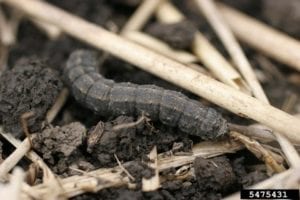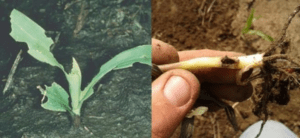By Lexie Maloy
Product Marketing Intern
The threat of black cutworms is a possibility every year. These pests arrive yearly in April and May with spring storms after migrating from the South. Their damage can range from very little to severe cases of stand loss in cornfields. Midwest cornfields serve as a main hotspot for these insects. Currently, a moderate amount of flights have been documented throughout the Midwest. With lots of corn currently planted and emerging, now is a good time to start scouting for black cutworm larvae.
Scouting for black cutworm should be done at least weekly. Beginning at first emergence all the way until stage V6. Look for cut or wilting plants out in the field, these plants may lead you to larvae by carefully removing soil around the affected plants. Another way to find out when and where black cutworms will occur is to place pheromone traps out in your field to monitor their arrival. The next step is identifying the black cutworm to make sure it isn’t a different type of larvae. The black cutworm is light grey to black in color with four dark tubercles on top of each abdominal segment.
Environment plays an important role in whether or not black cutworms are likely to infest your cornfields. Black cutworms are most likely to show up in fields that are near perennial vegetation, low lying, poorly drained, have reduced tillage practices, and use cover crops. Weed control and spring tillage can help reduce the chances of moths laying eggs in your fields.
What happens if you find black cutworms out in your field? Check to see if they are at the threshold to be an economic concern. Iowa State University identifies the threshold for black cutworms to be 2-3% of plants cut when the black cutworm larvae are less than ¾ inch long and 5% of plants cut when larvae are greater than ¾ inch long. If you are at the threshold, contact your AgVenture Yield Specialist to see if a rescue treatment is the most appropriate approach.
To avoid black cutworm infestations in your field, ask your AgVenture Yield specialist about planting AgVenture hybrids with in-plant insect control in the future. AgVenture corn hybrids featuring Optimum® AcreMax® Leptra® insect protection and Optimum® AcreMax® insect protection, as well as Qrome® products, all offer some protection from the black cutworm. AcreMax Leptra giving the best defense. Lastly, when you are out in your fields taking stand counts, be sure to look for black cutworms as well.
Agrisure® and Agrisure Viptera® are registered trademarks of, and used under license from, a Syngenta Group Company. Agrisure® technology incorporated into these seeds is commercialized under a license from Syngenta Crop Protection AG. Liberty®, Liberty Link® and the Water Droplet Design are trademarks of BASF. Roundup Ready® is a registered trademark used under license from Monsanto Company.
![]()

